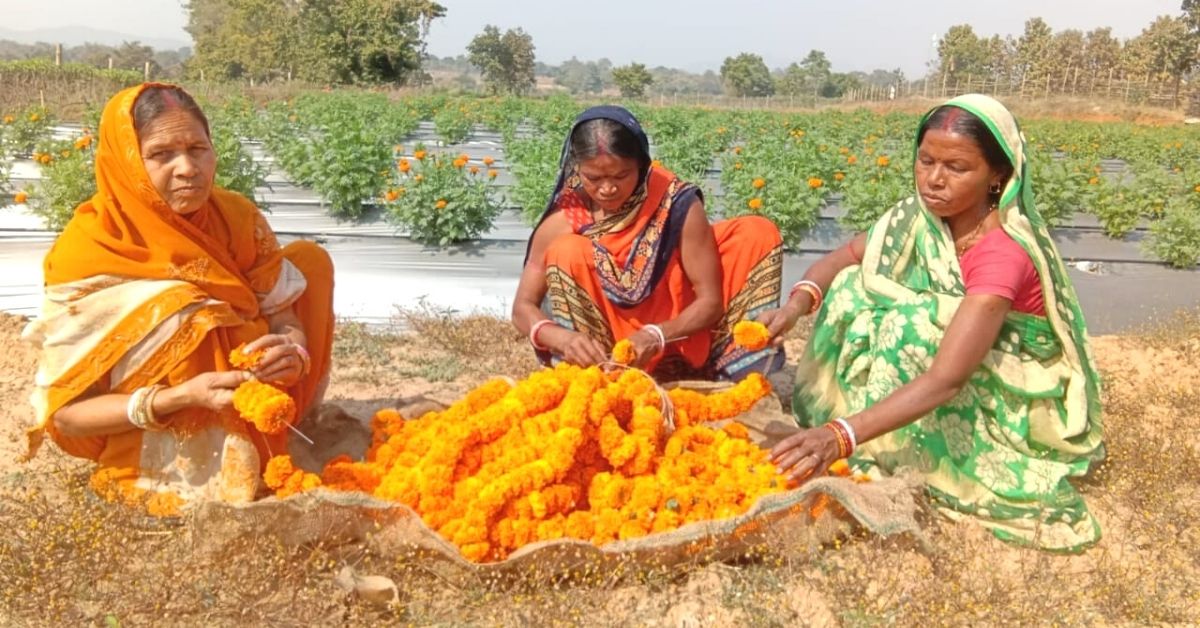In 2014, shortly after Dhanbad’s Ravi Nishad bagged an IT job in Delhi, his mother fell ill and passed away.
“She suffered from respiratory disease. The pollution from coal mines was responsible for her health. Dhanbad is the capital of coal mines, and pollution is a major issue in the region,” Ravi tells The Better India.
The repercussions of the environmental crisis on his mother left Ravi distraught. As a tribute to her, he started plantation drives in public places by launching an NGO, Samarpan Seva Samiti, and involved like-minded people for the cause.
“However, many people said this initiative will not have a significant impact on the environment,” he says. In his mother’s memory, he knew he had to do something bigger.
For the farmers

Ravi says that one of the volunteers of his plantation drive suggested he pursue an activity that will be socially and economically beneficial at large. “I also wanted to make a bigger impact on the environment, and it was around the same time I observed something peculiar. My journey between Delhi and Dhanbad by train was mesmerising, with the view of the lush green farms along the route. However, this behind scenic view was a harsh reality,” he adds. “The economic condition of farmers in the region was declining.”
“The pollutants emitted from the mines affected the crops and their production. Moreover, many young farmers moved to the city in search of jobs. Further interactions with local farmers helped me understand that many had migrated to urban areas to work as masons, labourers and in other low-skilled jobs in the cities,” Ravi says. He adds that he also learned that farmers were selling their lands to real estate developers.
“It meant that agricultural activity in Dhanbad was drastically shrinking. The worsening situation demanded change. Hence, I decided to work towards the betterment of the farming community. But the cause would succeed only if there was a parallel social and economic development of the community,” he adds.
Ravi then quit his job and roped in his childhood friends, Ranjit Kumar and Amit Mishra, to launch RPA Farming, a farmer producer company in 2016, aiming to better the lives of the farmers.
“The idea was to discourage farmers from using chemical fertilisers and pesticides. The move would help increase farm yield, thereby reflecting in income and motivate them to continue farming instead of giving up the activity entirely,” Ravi explains.

Ravi and his friends learned organic farming methods on a 2-acre land in Bhuli. “We became well-versed in using Jeevamrut, a mix of cow dung, cow urine, gram flour and jaggery, vinegar and crop residue to make organic fertiliser for crops. We extended the work on about 20 acres of leased barren land in Tetulmari, growing papaya, marigold and other fruit crops such as guava, litchi, pomegranate and chikoo,” he says.
Ravi adds that they chose the barren land on purpose to demonstrate how organic farming can succeed in a coal affected area. “Today, the 20-acre land produces 100 kilos of marigold every day from each acre of the plantation. We sell it to local florists and nearby markets,” he says.
They also planted 2,000 papaya trees that produce 50 kilos a day. The fruits weigh almost 2.5 kilos each. The RPA has employed 60 farmers for harvesting and sells the produce in the market.
“To market the farm produce, we used social media platforms to promote our harvest and find potential buyers,” Ravi says, adding, “The move helped us tap markets outside Dhanbad, thus increasing earnings.
Today, the farmer producer company has increased cultivation on 140 acres of leased land and earns Rs 50 lakh a month. “As word spread, more farmers were motivated to replicate the model,” he adds.
Since then, Ravi and his team have connected with over 2,000 farmers and helped convert 400 to organic farming.
Rupesh Mahto, a Maneta-based farmer, says that his income has doubled since he switched to the organic farming techniques that Ravi has introduced. “I used to grow vegetables using chemical farming methods and decided to introduce marigold and papaya after attending a training session organised by the company. After that, I stopped using chemical fertilisers, which helped me save on production cost. In addition, I sold organically grown tomatoes at Rs 60 a kilo against the Rs 20-30 per kilo price received from growing the fruit using chemical methods,” he adds.
‘Fruit capital of the country’

While the team is receiving success, Ranjit says that the most challenging part of their initiative was to convince farmers. “Initially, the farmers felt that changing to organic farming was unnecessary and chose to rely on previous trusted practices of using chemicals. Hence, we started showing them demos in small areas and in clusters to show the benefits of organic farming,” he says.
He adds, “Growing fruits and flowers is uncommon in Jharkhand, and it took additional efforts to convince the farmers to experiment with the same.”
Emphasising on the need to increase organic farming, Ravi says, “Farming has earned significant importance during the COVID-19 pandemic. Many migrants returned to their village and have realised that they need an economically sustainable source of income.”
He adds that more farmers now prefer agricultural activity rather than opting for opportunities in the urban areas. “The locals now understand the importance of their land and the socio-economic viability of agriculture,” he says.
Ravi says that Dhanbad is famous for its coal mines and contributes immensely to India’s economic growth. “I hope organic farming earns it a new identity as a fruit capital, which increases both economic and environmental prosperity. That is our ultimate aim,” he adds.
Edited by Divya Sethu
No comments:
Post a Comment